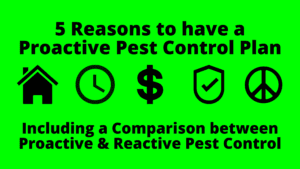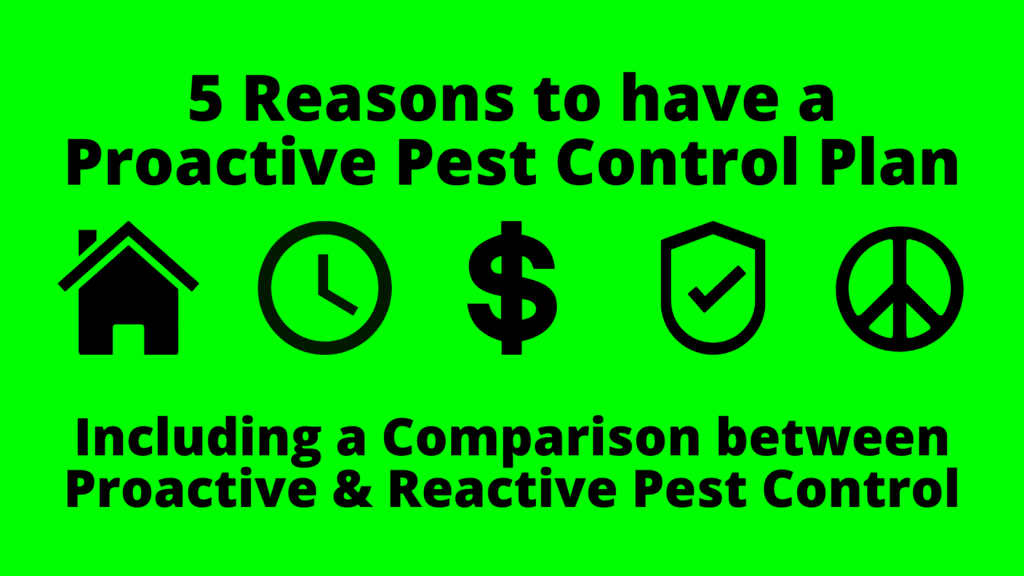If you’ve ever tried DIY craft projects from Pinterest and ended up disappointed, this post is for you. You’re not alone.
Here we explore the definitions of “reactive” and “proactive” pest control, we give some examples of reactive pest control and proactive pest control, and we cover 5 reasons to have a proactive pest control plan.
You will learn a bit about our preventative pest control plans and our one-time services. Ultimately, we want to help you, save you time and money. It’s why we are in business. Look no further for all of your reactive and proactive pest control services than Done Right Pest Solutions. Give us a call sometime, 651-342-9489.
Table of Contents
- “Reactive” and “Proactive” defined
- Examples of reactive pest control
- Examples of proactive pest control
- 5 reasons to have a proactive pest control plan
- Conclusion & next steps
“Reactive and “Proactive” Defined
Merriam-Webster’s dictionary defines the word “reactive” as “readily responsive to a stimulus” or “occurring as a result of something.” In other words, there was a cause–an issue–and how you respond to that issue is reactive.
We are very familiar with reactive pest control. An issue comes up that you didn’t know about, and you have to get it taken care of. Simple.
One of the blights of human existence is you don’t know something is an issue until you know something is an issue. And it’s so easy as homeowners to overlook warning signs of an issue simply because you don’t know it’s a warning sign. Or maybe you had thought, ‘huh, that’s weird,’ but then went about your day. It happens.
But issues do come up. They always do. And when they do, we’re here for you with the expert staff and effective products to solve any pest issue that you are reacting to.
Likewise, some of us are more proactive than others. Merriam-Webster’s defines “proactive” as “acting in anticipation of future problems, needs, or changes.” Being proactive means you know that you can’t control everything in life, so you put the necessary systems in place for when things happen.
The main difference between reactive pest control and proactive pest control is that in proactive pest control you’re in charge.
I always think of proactive in terms of insurance. You have car insurance, but why? You have car insurance because in case of accident involving your vehicle, the insurance covers you financially. People have all types of insurances: car, renters, home, health, supplemental health, phone, flood… The list goes on.
While maybe not every insurance is beneficial, or beneficial for you, home insurance and maintenance is absolutely necessary if you own a home. And at some point of owning a home, you will need pest control.
In the commercial industry, pest control is a must-have. If you own a restaurant, the FDA mandates a preventative pest control plan. Or if you own an apartment building, the EPA strongly recommends a preventative pest control plan. Why? Because pests happen.
With imports and exports coming and going all around the world, with travel readily available to anyone, pests spread. And the FDA and EPA understand this and want businesses to be prepared to have a proactive and preventative pest control system in place before something happens.
If you own or manage an apartment building or apartment complex, check out our study and guide: What to Pay for Pest Control.
But issues do come up. They always do. And when they do, we’re here for you with the expert staff and effective products to solve any pest issue that you are reacting to.
Examples of Reactive Pest Control
An example of reactive pest control is like any of our one-time services. Take mice, for example. You just noticed you have some droppings in your laundry room. That activity sign of mice alerted you to the issue and you may call a pest control company to take care of that issue for you.
Carpenter ants are a good example, too. Carpenter ants are nocturnal, so you might go days, weeks, months without even knowing that you have them in a wall void of your home. You just noticed some sawdust by a window frame, but haven’t done any construction there. You know something is amiss, so you Google why there might be sawdust there. You realize you have carpenter ants and you may call a pest control company to take care of that issue for you.
Maybe you live near a river and have terrible mosquitoes in the summer months. You get so fed up with the bites and itching the bites. Yes, pest control companies have reactive services and proactive services for mosquitoes and ticks.
Once you know you have a pest issue, whatever that pest issue may be, you may call for one of our one-time services. We come out, take care of whatever pest issue you may have, follow-up, and give you a warranty for that specific pest, and you’re on with your life. That’s awesome!
Others still, may opt to get on a proactive pest control plan once they’ve had a pest issue because it was stressful and they don’t want to have to worry about it anymore. That’s awesome too! And, yes, we offer upgrades to our proactive and preventative pest control plan so you’re not paying through the nose for your pest control needs.
Examples of Proactive Pest Control
An example of proactive pest control is maybe you bought a new house and you don’t know what kinds of pests may be inclined to invade. You noticed something about mice in the closing agreements, but what else could there be? You decide to look around to pest control companies for a type of annual preventative maintenance plan, something to ensure that preventative measures are taken so you don’t have any pest surprises.
Our Peak Seasons Plan offers seasonal treatments in the spring, summer, and fall to prevent any types of crawling, jumping, flying, or stinging insects from becoming a nuisance in and around your home. Mice and rats are also included, as are Japanese beetles.
This plan is the most comprehensive pest control plan offered, covering 99% of residential pests, and is our only residential year-round service. To learn more about the Peak Seasons Plan, and whether it might fit your pest needs, check out our article “How to Know if the Peak Seasons Plan is for You.”
Other proactive pest control examples are if you know you will have mosquitoes and ticks in your yard based on previous years. We offer a Mosquito and Tick Plan that comes with monthly yard treatments using a controlled-solution approach to treat these pests in areas they harbor and breed. Mosquitoes and ticks are nothing to mess with. Not only are they a bother with itching bites or removing ticks, they also carry and spread diseases.
Or maybe you had mole activity in your yard last year and you know they will come back, but you want your yard to flat with no raised hills and annoying holes. Our other seasonal approach for yard pests is our Mole service that is also offered as a one-time service with a follow-up, for smaller cases of moles. We use a carbon dioxide machine to kill the moles, verses a dangerous trap or poison bait that your pets or children could get into.
The main difference between reactive pest control and proactive pest control is that in proactive pest control you’re in charge.
5 Reasons to Have a Proactive Pest Control Plan

Now that you know the difference between reactive pest control and proactive pest control, here are 5 reasons to implement a proactive pest control plan, like the Peak Seasons Plan.
- Protects your family. Pests carry diseases and a lot of them spread diseases, too. Mice do, cockroaches do, rats do, flies do, fleas do, mosquitoes do, ticks do, and more. Preventative pest control eliminates the majority of these pests, eliminating most of the risk of you or your family getting sick from them.
- Saves you time and stress. Have you ever tried DIY crafts? And how often does it go as planned or turn out like the Pinterest picture? Not very often, right? Things don’t turn out as planned, and DIY pest control is often the same way. You have to take a lot of time to research up on products and how to apply them (plus most folks don’t store chemicals properly). You stress about the process in general and the outcome. Hiring a pest control company to do the work for you takes away that stress, and having a preventative pest control plan in place takes away that stress for a whole year!
- Saves you money. Sure, annual pest control is more than a dollar a day, but it is way less than a coffee a day. But aside from that initial cost, preventative pest control plans save you in the long run. You don’t have to purchase expensive products. And we’ll save you money by preventing destructive pests from making a home in your home.
- Protects your customers. This reason is more for commercial clients, but if you have a home-based business, your customers would benefit from your preventative pest control plan. Nothing surprising getting in with your goods going out.
- Gives you peace of mind. You can have guests over without having to worry about something coming up. Imagine that your guests find mouse droppings in their bedroom: not fun! With a preventative pest control plan, you don’t have to worry about that happening, because if you see an issue randomly come up, just give us a call. You’re covered!
For more information on seasonal pest control, check out our category within our blog.
Conclusion & Next Steps
We hope you learned a lot about the differences between reactive pest control and proactive pest control. The main difference is with proactive pest control, you’re in charge. You learned a bit about our services that we provide for both reactive pest control and proactive pest control.
Our most popular preventative pest control plan is the Peak Seasons Plan which covers you year-round. You also learned of our other preventative pest control service options.
Finally, you learned 5 reasons to have a proactive pest control plan. We want you safe and at ease in your own home. There are more important things in life to worry about than pests, and we know this. Let us take away the stress of pests for you today.
We’re here to help.
Done Right Team
Have you had a reactive pest control problem you had to solve, like carpenter ants, mice, or something else? How did you solve it? We’d love to hear from you in the comments!
Want to learn more about different pests and helpful tips to prevent them? Or maybe about services and promotions we offer? Sign up for our newsletter!

